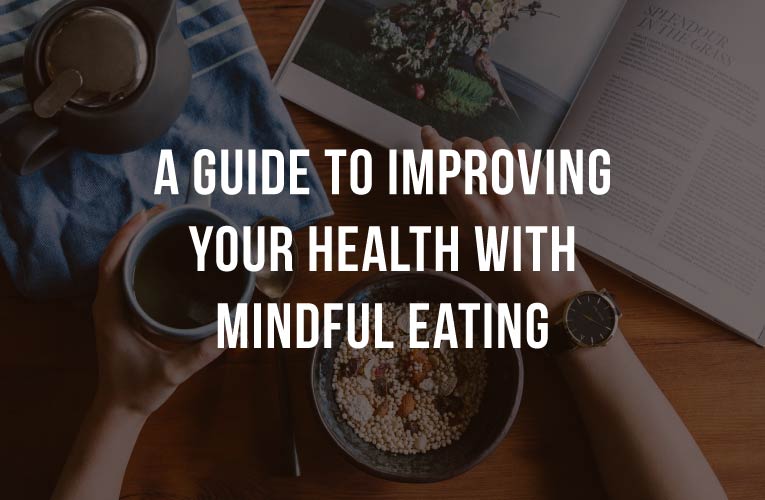Mindful eating. Sounds nice but kind of ambiguous. I know I’ve written a lot about mindfulness this summer but mindfulness is just an easy and helpful practice to incorporate into your daily life.
Often, our minds are focused on either the past or the future rather than the present moment. This takes away our ability to give our full attention not only to our physical bodies but also our emotional state of being, leaving us feeling neglected, anxious, or worn out after a full day.
Here are some tips on mindful eating that may improve your health:
- Reduce distractions. Mindful eating requires your full attention. It is recommended that you eat meals sitting down, without distraction, so that we may be more mindful of what we are thinking and feeling when we eat. Eating meals in front of your phone, computer or tv will take up most of your attention. You may find that once you eliminate these distractions, you’ll be more aware of the present moment (Monroe 2015).
- Practice gratitude. Did you know that 1/3 of food in this country is thrown away?! By appreciating the abundance of the food around you, you may realize that the food you have will be enough and be less likely to overeat.
- Listen to your body. Be aware of your body’s signs. We usually feel hungry before we feel thirsty, however, our body needs water regularly or we feel tired and fatigued. Headaches and sluggishness is not always a need for coffee or something sweet, but rather your body’s signal for WATER. (Understanding Hunger…nd). Paying attention to how you feel when you eat is also enables us to make smarter choices regarding our meals. Fruits and vegetables are also a vitamin and water dense source of nutrition. Incorporate them throughout your day and stay hydrated! Your body will thank you.
- Notice when you’re full. It can take up to 20 minutes for our bodies to initially process food and make us feel full. If you eat a large meal in this time, there’s no doubt that you’ll likely feel stuffed and sluggish by the time you’re finished eating. By practicing mindfulness, we are more likely to become aware when we have had enough.
- Eat less processed foods or none at all. You may notice that you feel great when eating a diet low in processed foods, and poorly after eating a meal full of them. There are numerous studies that suggest eating high contents of processed sugars and meats may contribute to an increased risk of type 2 diabetes, cardiovascular disease, and certain types of cancers.
Don’t forget that mindfulness is a method that only YOU can put to work. Trust your gut and listen to what your food is telling you!
Now, you may be struggling with the question “What should I be eating?” For a personalized plan, I recommend seeing a dietitian or nutritionist. However, if you’re looking for a quick and easy start, try one of my favorite, veggie packed dinners. I really enjoy it and it truly makes me feel great.
The idea is to pack as many nutrients into one easy meal as possible.
- Start with a type of complex carb, such as sweet potatoes or black beans. They are high in dietary fiber and may reduce your risk of chronic disease.
- Add a vegetable (steamed green beans, corn, carrots, etc).
- Stack on some protein to keep you full! Add in plant based proteins, like lentils, beans, tofu, tempeh or pumpkin seeds. Broccoli and spinach also contain high concentrations of protein.
- Don’t forget your greens! Dark leafy greens, like kale, spinach, and chard, alkalize your body’s pH which helps flush out free radicals (toxins) in our bodies!
- Lastly, make sure you are eating healthy fats. I usually top my bowls with olive oil, avocado or hemp seeds. Healthy fats are also a good source of Omega-3s.

Photo credit courtesy of my sister Julia Ansell, who is currently running a blog tracking her meals as a part of her eating disorder recovery.
(2018). Reduce Processed Meats to Improve Your Heart Health: Eating cold cuts and breakfast meats could raise your risk of heart disease and cancer. Women’s Nutrition Connection. p. 4.
H.J.E.M. Alberts, R. Thewissen, L. Raes (2012). Dealing with problematic eating behaviour.
The effects of a mindfulness-based intervention on eating behaviour, food cravings, dichotomous thinking and body image concern. Appetite, 58 (3), pp. 847-851.
Monroe, J. T. (2015). Mindful Eating. American Journal of Lifestyle Medicine, 9(3), 217-220. doi:10.1177/155982761556968.
Understanding Hunger and Fullness Cues. (n.d.). Retrieved from http://www.findingbalance.com/articles/understanding-hunger-and-fullness-cues/

